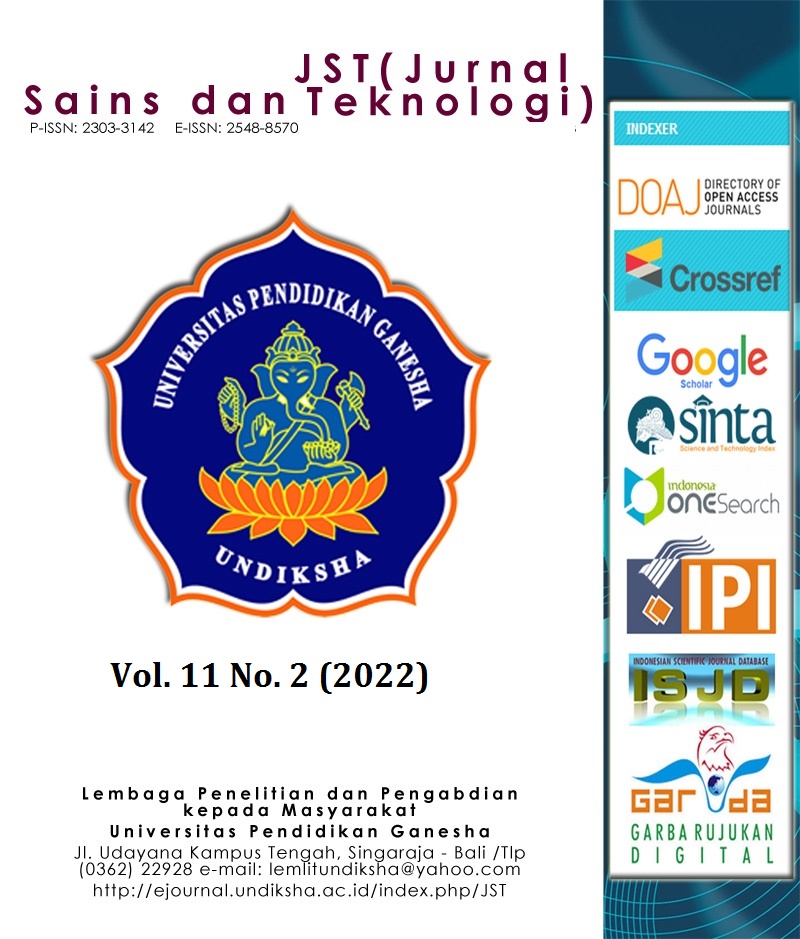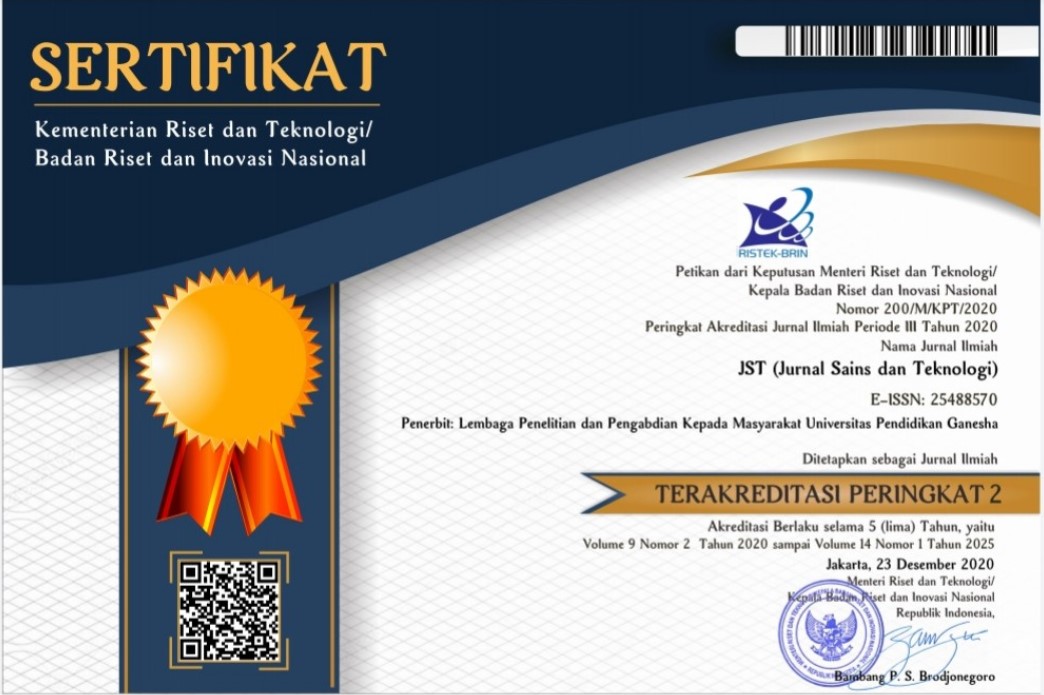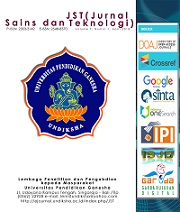Antidepressant-Like Activity and Physicochemical Analysis of Essential Oils from Michelia alba and Plumeria alba Flowers
DOI:
https://doi.org/10.23887/jstundiksha.v11i2.45291Keywords:
essential oil, forced swim test, GC-MS, Michelia alba, Plumeria albaAbstract
Depression is a mental disorder with an increased prevalence. Other than conventional antidepressants, essential oils have been used in aromatherapy as a complementary and alternative medicine to reduce depression. In the current study, the antidepressant-like activity of the inhalation of essential oils from Michelia alba (MAEO) and Plumeria alba (PAEO) flowers was analyzed using the forced swim test. The immobility time of mice from tested groups was evaluated statistically by the non-parametric Kruskal Wallis test, followed by the Mann Whitney post hoc test. Also, the characterization of both essential oils was determined by refractive index, solubility, and Gas Chromatography-Mass Spectrophotometry (GC-MS) analysis. PAEO showed stronger antidepressant-like activity than MAEO (p<0.05) and it was equal to the positive control (essential oil of Lavandula angustifolia) (p>0.05). The GC-MS analysis revealed some calming agents in MAEO and PAEO such as linalool, linalyl acetate, phenylethyl alcohol, and methyl anthranilate.
References
Abbasi-Maleki, S., Kadkhoda, Z., & Taghizad-Farid, R. (2020). The antidepressant-like effects of Origanum majorana essential oil on mice through monoaminergic modulation using the forced swimming test. Journal of Traditional and Complementary Medicine, 10(4), 327–335. https://doi.org/10.1016/j.jtcme.2019.01.003.
Anggoro, B., & Hariono, M. (2020). Journal of Medicinal Plants Research Future molecular medicine from white frangipani (Plumeria alba L.): A review. 14(10), 544–554. https://doi.org/10.5897/JMPR2020.6947.
Anwar, F., Sulman, M., Hussain, A. I., Saari, N., Iqbal, S., & Rashid, U. (2011). Physicochemical composition of hydro-distilled essential oil from coriander (Coriandrum sativum L.) seeds cultivated in Pakistan. Journal of Medicinal Plants Research, 5(15), 3537–3544.
Avram, S., Silvia Stan, M., Maria Udrea, A., Buiu, C., & Mernea, M. (2021). The study of natural compounds as antidepressants by bioin-formatics methods †. 1–26.
Baser, K. H. C., & Buchbauer, G. (2016). Handbook of essential oils. Science, Technology, and applications,. In CRSC Press.
Bogdanova, O. V., Kanekar, S., D’Anci, K. E., & Renshaw, P. F. (2013). Factors influencing behavior in the forced swim test. In Physiology and Behavior (Vol. 118, pp. 227–239). Elsevier Inc. https://doi.org/10.1016/j.physbeh.2013.05.012.
Bueno-Notivol, J., Gracia-García, P., Olaya, B., Lasheras, I., López-Antón, R., & Santabárbara, J. (2021). Prevalence of depression during the COVID-19 outbreak: A meta-analysis of community-based studies. International Journal of Clinical and Health Psychology, 21(1). https://doi.org/10.1016/J.IJCHP.2020.07.007.
Chiang, H. M., Chen, H. C., Lin, T. J., Shih, I. C., & Wen, K. C. (2012). Michelia alba extract attenuates UVB-induced expression of matrix metalloproteinases via MAP kinase pathway in human dermal fibroblasts. Food and Chemical Toxicology, 50(12), 4260–4269. https://doi.org/10.1016/J.FCT.2012.08.018.
Dougnon, G., & Ito, M. (2020). Inhalation Administration of the Bicyclic Ethers 1,8- and 1,4-cineole Prevent Anxiety and Depressive-Like Behaviours in Mice. Molecules 2020, Vol. 25, Page 1884, 25(8), 1884. https://doi.org/10.3390/MOLECULES25081884.
Guzmán-Gutiérrez, S. L., Bonilla-Jaime, H., Gómez-Cansino, R., & Reyes-Chilpa, R. (2015). Linalool and β-pinene exert their antidepressant-like activity through the monoaminergic pathway. Life Sciences, 128, 24–29. https://doi.org/10.1016/J.LFS.2015.02.021.
Ito, K., & Ito, M. (2011). Sedative effects of vapor inhalation of the essential oil of Microtoena patchoulii and its related compounds. Journal of Natural Medicines, 65(2), 336–343. https://doi.org/10.1007/s11418-010-0502-x.
Karakaya, S., El, S. N., Karagozlu, N., Sahin, S., Sumnu, G., & Bayramoglu, B. (2012). Microwave-assisted hydrodistillation of essential oil from rosemary. Journal of Food Science and Technology 2011 51:6, 51(6), 1056–1065. https://doi.org/10.1007/S13197-011-0610-Y.
Koomhin, P., Sattayakhom, A., Chandharakool, S., Sinlapasorn, J., Suanjan, S., Palipoch, S., Na-ek, P., Punsawad, C., & Matan, N. (2020). Michelia Essential Oil Inhalation Increases Fast Alpha Wave Activity. Scientia Pharmaceutica 2020, Vol. 88, Page 23, 88(2), 23. https://doi.org/10.3390/SCIPHARM88020023.
Lawal, O. A., Ogunwande, I. A., & Opoku, A. R. (2014). Constituents of Essential Oils from the Leaf and Flower of Plumeria alba Grown in Nigeria: Https://Doi.Org/10.1177/1934578X1400901121, 9(11), 1613–1614. https://doi.org/10.1177/1934578X1400901121.
Liang, M., Du, Y., Li, W., Yin, X., Yang, N., Qie, A., Lebaron, T. W., Zhang, J., Chen, H., & Shi, H. (2018). SuHeXiang Essential Oil Inhalation Produces Antidepressant- and Anxiolytic-Like Effects in Adult Mice. Biological & Pharmaceutical Bulletin, 41(7), 1040–1048. https://doi.org/10.1248/BPB.B18-00082
Radulovic̈, N. S., Miltojevic̈, A. B., Randjelovic̈, P. J., Stojanovic̈, N. M., & Boylan, F. (2013). Effects of methyl and isopropyl N-methylanthranilates from Choisya ternata Kunth (Rutaceae) on experimental anxiety and depression in mice. Phytotherapy Research : PTR, 27(9), 1334–1338. https://doi.org/10.1002/PTR.4877.
Sahoo, A., Dash, B., Jena, S., Ray, A., Panda, P. C., & Nayak, S. (2021). Phytochemical Composition of Flower Essential Oil of Plumeria alba Grown in India. Https://Doi.Org/10.1080/0972060X.2021.1965036, 24(4), 671–676. https://doi.org/10.1080/0972060X.2021.1965036.
Sindle, A., & Martin, K. (2020). Essential oils – Natural products not necessarily safe. In International Journal of Women’s Dermatology. Elsevier Inc. https://doi.org/10.1016/j.ijwd.2020.10.013.
Sohrabi, R., Pazgoohan, N., Seresht, H. R., & Amin, B. (2017). Repeated systemic administration of the cinnamon essential oil possesses anti-anxiety and anti-depressant activities in mice. Iranian Journal of Basic Medical Sciences, 20(6), 708–714. https://doi.org/10.22038/IJBMS.2017.8841.
Songsamoe, S., Khunjan, K., & Matan, N. (2021). The application and mechanism of action of Michelia alba oil vapour in GABA enhancement and microbial growth control of germinated brown rice. Food Control, 130, 108401. https://doi.org/10.1016/J.FOODCONT.2021.108401.
Sousa, D. P. De, Silva, R. H. N., Silva, E. F. da, & Gavioli, E. C. (2017). Essential Oils and Their Constituents: An Alternative Source for Novel Antidepressants. Molecules 2017, Vol. 22, Page 1290, 22(8), 1290. https://doi.org/10.3390/MOLECULES22081290.
Swati, M., Monalisa, J., & Abhisek, P. (2013). Evaluation of antidepressant activity of Eclipta alba using animal models. Asian Journal of Pharmaceutical and Clinical Research, 6(3), 118–120.
Tabari, M. A., Moghaddam, A. H., Maggi, F., & Benelli, G. (2018). Anxiolytic and antidepressant activities of Pelargonium roseum essential oil on Swiss albino mice: Possible involvement of serotonergic transmission. Phytotherapy Research : PTR, 32(6), 1014–1022. https://doi.org/10.1002/PTR.6038.
Ueno, H., Shimada, A., Suemitsu, S., Murakami, S., Kitamura, N., Wani, K., Matsumoto, Y., Okamoto, M., & Ishihara, T. (2019). Anti-depressive-like effect of 2-phenylethanol inhalation in mice. Biomedicine & Pharmacotherapy = Biomedecine & Pharmacotherapie, 111, 1499–1506. https://doi.org/10.1016/J.BIOPHA.2018.10.073.
Ueyama, Y., Hashimoto, S., Nii, H., & Furukawa, K. (2011). The Chemical Composition of the Flower Oil and the Leaf Oil of Michelia alba D.C. Http://Dx.Doi.Org/10.1080/10412905.1992.9698004, 4(1), 15–23. https://doi.org/10.1080/10412905.1992.9698004.
Yankelevitch-Yahav, R., Franko, M., Huly, A., & Doron, R. (2015). The Forced Swim Test as a Model of Depressive-like Behavior. Journal of Visualized Experiments, 2015(97), 52587. https://doi.org/10.3791/52587.
Zhang, Y., Long, Y., Yu, S., Li, D., Yang, M., Guan, Y., Zhang, D., Wan, J., Liu, S., Shi, A., Li, N., & Peng, W. (2021). Natural volatile oils derived from herbal medicines: A promising therapy way for treating depressive disorder. In Pharmacological Research (Vol. 164, p. 105376). Academic Press. https://doi.org/10.1016/j.phrs.2020.105376.
Downloads
Published
How to Cite
Issue
Section
License
Copyright (c) 2022 Ni Made Dwi Mara Widyani Nayaka, Ni Luh Putu Swari, Dewa Ayu Sri Bintang Widnyani, Ni Kadek Sukmayanti, Putu Era Sandhi Kusuma Yuda, I Gusti Ayu Agung Kusuma Wardani, Dwi Arymbhi Sanjaya

This work is licensed under a Creative Commons Attribution-ShareAlike 4.0 International License.
Authors who publish with the Jurnal Sains dan Teknologi (JST) agree to the following terms:
- Authors retain copyright and grant the journal the right of first publication with the work simultaneously licensed under a Creative Commons Attribution License (CC BY-SA 4.0) that allows others to share the work with an acknowledgment of the work's authorship and initial publication in this journal.
- Authors are able to enter into separate, additional contractual arrangements for the non-exclusive distribution of the journal's published version of the work (e.g., post it to an institutional repository or publish it in a book), with an acknowledgment of its initial publication in this journal.
- Authors are permitted and encouraged to post their work online (e.g., in institutional repositories or on their website) prior to and during the submission process, as it can lead to productive exchanges, as well as earlier and greater citation of published work. (See The Effect of Open Access)
















